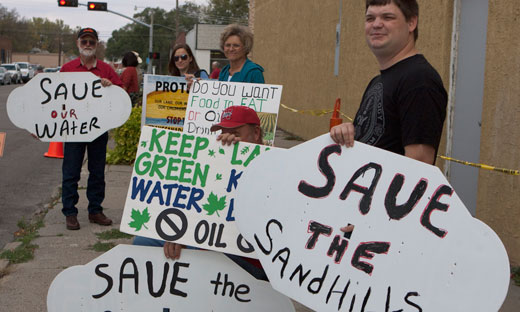
There are many reasons to oppose the building of an oil pipeline from the tar sands of Alberta, Canada, to the refineries off the shores of Texas in the Gulf of Mexico.
One: The employment impact of this Keystone XL pipeline will be far less than advertised. The GOP leadership says the pipeline “would create over 100,000 jobs,” but this is a gross inflation. According to the State Department, it will provide about 6,000 temporary jobs for construction workers. But even this number may be a significant overestimation. As for permanent jobs, the number will be far fewer, somewhere in the hundreds, according to TransCanada Corp., the company that will build the pipeline if it is approved.
Two: Meanwhile the project will put at risk a quarter million ranches and farms that provide real jobs in the Great Plains states.
Three: The environmental impact of the pipeline is potentially huge. It will cross more than 2,000 waterways, including the Yellowstone River in Montana, threatening rivers, lakes and streams with the same kind of pipeline accidents that have occurred elsewhere.
Four: Alberta’s tar sands produce bitumen, a low-grade crude oil, through a very dirty process that is destroying Canada’s boreal forest. In doing so it is putting at risk woodlands, watersheds, animals, plants, and an entire way of life for native peoples living there. The current mining moonscape is the size of Chicago, but pales in comparison with the future size of the mining operation if the pipeline is built.
Five: Oil from the tar sands won’t reduce dependence on Middle Eastern oil as claimed. Most of the oil will be refined and then exported to other countries.
Six: The extraction of oil from the tar sands produces three to four times more pollution than is caused by the conventional production of North American crude oil. This is not to defend the latter (we need energy alternatives to the burning of fossil fuels), but only to give some sense of the scale of the emissions of carbon into the atmosphere from the mining of tar sands.
Nothing could be more shortsighted and destructive, according to James Hansen, the foremost climate change expert in the U.S. The intensive production of tar sands oil, he says, is akin to setting off a fuse to the biggest carbon bomb on the planet.
In other words, it is no exaggeration to say that the further heating up of the earth that will come from tar sands mining and other forms of fossil fuel extraction and use constitutes a civilizational crisis – a crisis that threatens humanity’s future.
And yet we continue to dump heat-trapping gases into the atmosphere. At some point the various changes associated with global warming become unstoppable even if we take drastic measures to curb emissions of greenhouse gases.
So why are we doing it?
The simple answer is that the energy industrial complex and its political supporters on the right use their enormous power to shape our energy discourse and energy policy. If we could remove them from the equation (and we must) there is little reason to think that the pipeline and the extraction of oil from tar sands mining would go ahead.
But a full answer would also include the insufficient urgency attached to this existential threat by the American people. That is slowly changing, but the clock is ticking and approaching midnight, when global warming and its catastrophic consequences – extreme weather events, rising water levels, resource wars, loss of major agricultural areas and low-lying tracts of land, urban crises, food shortages, economic crises, and so forth – can’t be reversed.
The recently concluded climate change talks in Durban, South Africa, are illustrative of the problem we face.
Even though those negotiations were of critical importance to humanity’s future, the American people were bystanders to the talks. We read or heard about the Durban talks – more or less buried among other news – when we should have weighed in on what happened there. As a consequence, countries that are major polluters – cumulatively and currently – left Durban with no legally binding agreement to reduce emissions. The only result was a promise to (hopefully) negotiate a protocol by 2015 that will take effect in 2020.
This must change. The buildup of heat-trapping gases in the atmosphere must become a clarion call to Americans to up the ante at the local, national and international levels. Global warming must become an election issue next year. In the meantime, people from all walks of life must insist that the president do the right thing and cancel the Keystone XL pipeline project.
Of course, such actions will meet fierce resistance from the energy industrial complex and its right-wing supporters in government, but they can be defeated.
What is needed is unity and a many-sided plan to tackle global warming. The time for such a plan is now. The window of opportunity is narrow and closing. We owe it to future generations to act.
Photo: Demonstrators against the proposed Keystone XL pipeline in Norfolk, Neb., Oct. 11. (Nati Harnik/AP)










